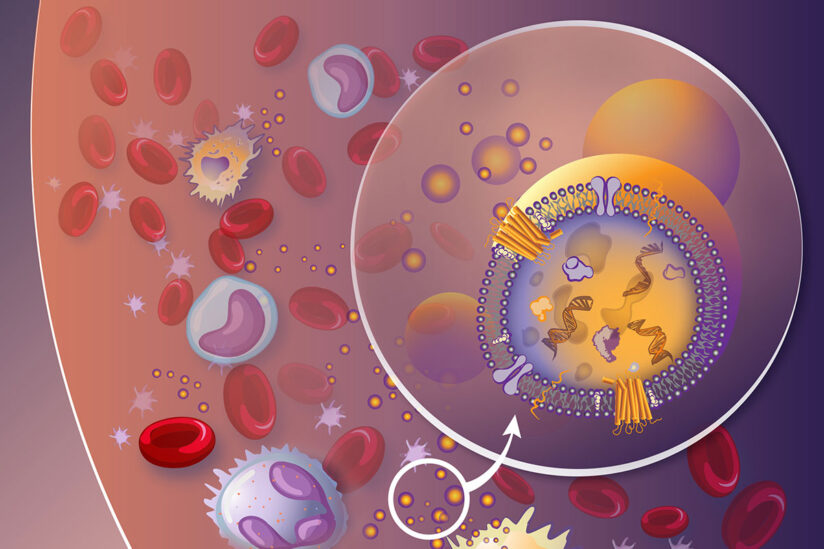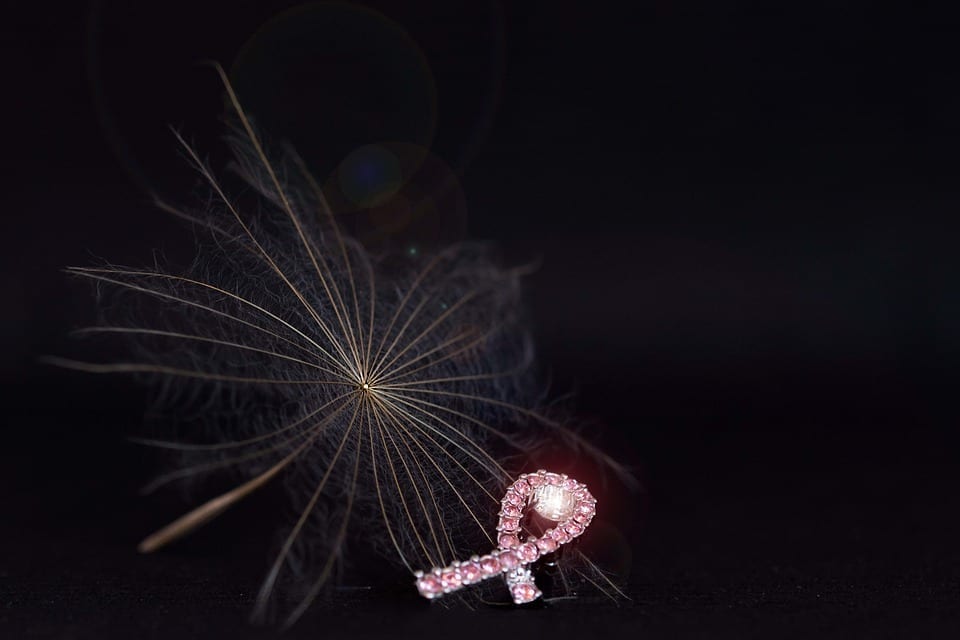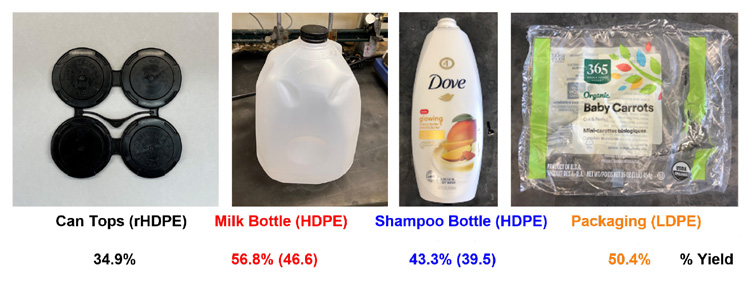
A special blood test called a liquid biopsy could determine whether a patient has breast cancer at its early stage and if that cancer is unlikely to return.
(Illustration/Yekaterina Kadyshevskaya)
A USC-led team of researchers finds remarkable results with the blood test in a small group of patients
A USC-led team of scientists has found indications that a special blood test called a liquid biopsy could determine whether a patient has breast cancer at its early stage and if that cancer is unlikely to return.
The high-definition comprehensive liquid biopsies are conducted using a standard blood draw from the arm of a patient in a doctor’s office. Once in the laboratory, the sample is examined for signs of cancer.
The study demonstrating the liquid biopsy results for early breast cancer detection was published on Sept. 27 in Nature’s npj Breast Cancer journal. The work was a collaboration between USC, Billings Clinic, Duke University, Epic Sciences and the USC Norris Comprehensive Cancer Center. The results raise hopes that one day doctors could detect breast cancer in patients with a simple blood draw.
The researchers at the USC Michelson Convergent Science Institute in Cancer (CSI-Cancer) are cautiously optimistic about their findings. They are eager to test and see whether the results will be proven in larger clinical trials to demonstrate the benefit of the method for patients everywhere.
It’s an amazing opportunity to change how early breast cancer detection is being done with a simple blood draw.
Peter Kuhn, USC’s CSI-Cancer
“It’s an amazing opportunity to change how early breast cancer detection is being done with a simple blood draw, but it’s only a research outcome at this point and we still need to demonstrate clinical benefit,” said Peter Kuhn, a USC cancer physicist who directs CSI-Cancer.
Breast cancer is the most prevalent form of cancer in the world, affecting 1 in 8 women over their lifetime.
Since 1976 when the American Cancer Society endorsed mammography X-rays, the technique — along with a tissue biopsy — has become the standard way for doctors to check patients for breast cancer.
Breast cancer detection: Mammography isn’t 100% accurate
But mammography is not 100% accurate and its detection can be impeded by healthy dense tissue. Mammography’s sensitivity to breast cancer is about 87%, according to the Breast Cancer Surveillance Consortium. And for some women, mammograms are not accessible, especially those living in poor isolated communities that have no clinics or hospitals. Other women simply do not get a regular mammogram.
But a tissue biopsy also is not a foolproof method. Although it can reveal information about the tumor, it has limitations. Doctors can sample only a small area and may fail to capture the full extent of the tumor. A tissue biopsy is also invasive and painful.
Combined, the drawbacks for diagnosis with mammograms and tissue biopsies mean some patients are not diagnosed until the cancer has grown and spread. New methodologies such as CSI-Cancer’s liquid biopsy can bring a complementary toolset into clinical practice.
For the study, Kuhn and his team worked with 100 breast cancer patients — some early and some late stage — and 40 patients without breast cancer from April 2013 through January 2017. The work was conducted at clinical sites including at the USC Norris cancer center at the Keck School of Medicine of USC; the Billings Clinic in Montana; the Duke University Cancer Institute in Durham, N.C.; and the City of Hope Comprehensive Cancer Center in Duarte.
The team tested a theory that the high-definition liquid biopsy could detect multiple cancer biomarkers, including the so-called “oncosomes” — nano-sized, membraned cargo carriers that enrich the body’s environment for cancer growth. These oncosomes are secreted by cancer cells as the group has shown previously.
“The news here is that we found the vast majority of early-stage breast cancer patients have these oncosomes at very robust levels,” said Kuhn, a Dean’s Professor at the USC Dornsife College of Letters, Arts and Sciences and cancer physicist. “They’re about 5-10 microns in diameter, about the size of a cell. We first identified these large vesicles in prostate cancer about a year-and-a-half ago and showed that they are related to the cancer. They are hiding in plain sight.”
A future diagnostic tool for breast cancer detection?
If further studies produce similar results, it could mean that the next generation high-definition liquid biopsy may become a diagnostic tool for early breast cancer detection and other cancers, he said. The test also could inform patients who have been treated for cancer that they will most likely remain cancer-free.
“Typically, I’m the bearer of bad news. I say, ‘You have cancer in your blood,’” Kuhn said. “But a test like this could give hope that if there is a sign of cancer, we can find it very early and improve treatment and survival.”
Original Article: Next-generation liquid biopsy detects nano-sized signs of breast cancer in early-stage patients
More from: University of Southern California | Duke University
The Latest Updates from Bing News & Google News
Go deeper with Bing News on:
Liquid biopsy for breast cancer
- Pancreatic Cancer Is Hard to Detect in Early Stages. A New Blood Test Could Help
A liquid biopsy can detect 97% of stage 1 and 2 pancreatic cancer cases, according to an early clinical trial. Blood tests could help improve early detection for the deadly cancer.
- Lung Cancer News
Liquid Biopsy Predicts Immunotherapy Response and ... Scientists Discover a New Way to Help Prevent Breast Cancer 'Time Bomb' Mar. 13, 2023 — Scientists have discovered why breast cancer cells ...
- Tumor Trash or Treasure? Liquid Biopsy for Colorectal Cancer
At Weill Cornell, he's the director of colorectal cancer research, as well as the precision medicine director for liquid biopsy research at the Englander Institute of Precision Medicine.
- JCO Precision Oncology Conversations
Liquid biopsy patients were consulted to have this CGP median one ... In Italy, I have also a mentor in breast cancer, Dr. Luca Gianni, one of the pioneers in breast cancer treatment. So knowing all ...
- How Is Metastatic Breast Cancer Diagnosed?
If breast cancer cells remain in the body after treatment and enter the bloodstream or lymphatic fluid, they can travel ... or have a biopsy result that indicates you're in a later stage of ...
Go deeper with Bing News on:
Breast cancer detection
- Why Your Breast Hurts in a Specific Spot
Experiencing pain or discomfort in the breasts is a common concern for many individuals. Several factors, ranging from hormonal fluctuations to more serious conditions like breast cancer, can ...
- Missing the Mark: How Breast Cancer Guidelines Fail Black Women
The USPSTF recently released its new guidelines for breast cancer screening, but here's why they still miss the mark for Black women.
- Why are Black women more likely to die of cancer? Cancer society launches long-term study
The American Cancer Society aims to enroll over 100,000 Black, cancer-free women between the ages of 25 and 55 and follow them for three decades.
- New breast cancer screening guidelines
Dr. Anne Peled, a breast cancer surgeon at Sutter Health, joined us on 'The Nine' to talk about the importance of early detection, and discussed her own personal experience with the disease.
- 'Younger patients tend to have more aggressive cancer': Breast cancer screening guidelines change
The U.S Preventative Services Task Force has lowered their age recommendation for women to get mammograms from 50 to 40.










